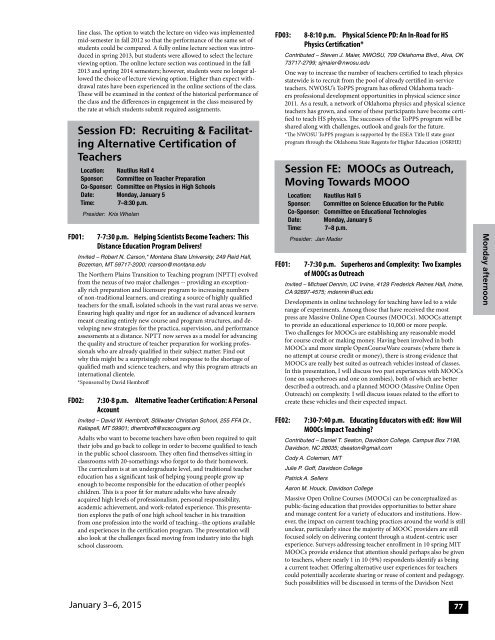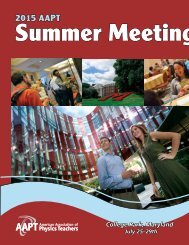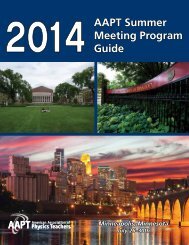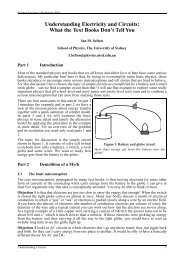final-program-12-23-14-3
final-program-12-23-14-3
final-program-12-23-14-3
You also want an ePaper? Increase the reach of your titles
YUMPU automatically turns print PDFs into web optimized ePapers that Google loves.
line class. The option to watch the lecture on video was implemented<br />
mid-semester in fall 20<strong>12</strong> so that the performance of the same set of<br />
students could be compared. A fully online lecture section was introduced<br />
in spring 2013, but students were allowed to select the lecture<br />
viewing option. The online lecture section was continued in the fall<br />
2013 and spring 20<strong>14</strong> semesters; however, students were no longer allowed<br />
the choice of lecture viewing option. Higher than expect withdrawal<br />
rates have been experienced in the online sections of the class.<br />
These will be examined in the context of the historical performance of<br />
the class and the differences in engagement in the class measured by<br />
the rate at which students submit required assignments.<br />
Session FD: Recruiting & Facilitating<br />
Alternative Certification of<br />
Teachers<br />
Location: Nautilus Hall 4<br />
Sponsor: Committee on Teacher Preparation<br />
Co-Sponsor: Committee on Physics in High Schools<br />
Date: Monday, January 5<br />
Time: 7–8:30 p.m.<br />
Presider: Kris Whelan<br />
FD01: 7-7:30 p.m. Helping Scientists Become Teachers: This<br />
Distance Education Program Delivers!<br />
Invited – Robert N. Carson,* Montana State University, 249 Reid Hall,<br />
Bozeman, MT 59717-2000; rcarson@montana.edu<br />
The Northern Plains Transition to Teaching <strong>program</strong> (NPTT) evolved<br />
from the nexus of two major challenges -- providing an exceptionally<br />
rich preparation and licensure <strong>program</strong> to increasing numbers<br />
of non-traditional learners, and creating a source of highly qualified<br />
teachers for the small, isolated schools in the vast rural areas we serve.<br />
Ensuring high quality and rigor for an audience of advanced learners<br />
meant creating entirely new course and <strong>program</strong> structures, and developing<br />
new strategies for the practica, supervision, and performance<br />
assessments at a distance. NPTT now serves as a model for advancing<br />
the quality and structure of teacher preparation for working professionals<br />
who are already qualified in their subject matter. Find out<br />
why this might be a surprisingly robust response to the shortage of<br />
qualified math and science teachers, and why this <strong>program</strong> attracts an<br />
international clientele.<br />
*Sponsored by David Hembroff<br />
FD02: 7:30-8 p.m. Alternative Teacher Certification: A Personal<br />
Account<br />
Invited – David W. Hembroff, Stillwater Christian School, 255 FFA Dr.,<br />
Kalispell, MT 59901; dhembroff@scscougars.org<br />
Adults who want to become teachers have often been required to quit<br />
their jobs and go back to college in order to become qualified to teach<br />
in the public school classroom. They often find themselves sitting in<br />
classrooms with 20-somethings who forgot to do their homework.<br />
The curriculum is at an undergraduate level, and traditional teacher<br />
education has a significant task of helping young people grow up<br />
enough to become responsible for the education of other people’s<br />
children. This is a poor fit for mature adults who have already<br />
acquired high levels of professionalism, personal responsibility,<br />
academic achievement, and work-related experience. This presentation<br />
explores the path of one high school teacher in his transition<br />
from one profession into the world of teaching--the options available<br />
and experiences in the certification <strong>program</strong>. The presentation will<br />
also look at the challenges faced moving from industry into the high<br />
school classroom.<br />
FD03: 8-8:10 p.m. Physical Science PD: An In-Road for HS<br />
Physics Certification*<br />
Contributed – Steven J. Maier, NWOSU, 709 Oklahoma Blvd., Alva, OK<br />
73717-2799; sjmaier@nwosu.edu<br />
One way to increase the number of teachers certified to teach physics<br />
statewide is to recruit from the pool of already certified in-service<br />
teachers. NWOSU’s ToPPS <strong>program</strong> has offered Oklahoma teachers<br />
professional development opportunities in physical science since<br />
2011. As a result, a network of Oklahoma physics and physical science<br />
teachers has grown, and some of these participants have become certified<br />
to teach HS physics. The successes of the ToPPS <strong>program</strong> will be<br />
shared along with challenges, outlook and goals for the future.<br />
*The NWOSU ToPPS <strong>program</strong> is supported by the ESEA Title II state grant<br />
<strong>program</strong> through the Oklahoma State Regents for Higher Education (OSRHE)<br />
FE01:<br />
Session FE: MOOCs as Outreach,<br />
Moving Towards MOOO<br />
Location: Nautilus Hall 5<br />
Sponsor: Committee on Science Education for the Public<br />
Co-Sponsor: Committee on Educational Technologies<br />
Date: Monday, January 5<br />
Time: 7–8 p.m.<br />
Presider: Jan Mader<br />
7-7:30 p.m. Superheros and Complexity: Two Examples<br />
of MOOCs as Outreach<br />
Invited – Michael Dennin, UC Irvine, 4<strong>12</strong>9 Frederick Reines Hall, Irvine,<br />
CA 92697-4575; mdennin@uci.edu<br />
Developments in online technology for teaching have led to a wide<br />
range of experiments. Among those that have received the most<br />
press are Massive Online Open Courses (MOOCs). MOOCs attempt<br />
to provide an educational experience to 10,000 or more people.<br />
Two challenges for MOOCs are establishing any reasonable model<br />
for course credit or making money. Having been involved in both<br />
MOOCs and more simple OpenCourseWare courses (where there is<br />
no attempt at course credit or money), there is strong evidence that<br />
MOOCs are really best suited as outreach vehicles instead of classes.<br />
In this presentation, I will discuss two past experiences with MOOCs<br />
(one on superheroes and one on zombies), both of which are better<br />
described a outreach, and a planned MOOO (Massive Online Open<br />
Outreach) on complexity. I will discuss issues related to the effort to<br />
create these vehicles and their expected impact.<br />
FE02:<br />
7:30-7:40 p.m. Educating Educators with edX: How Will<br />
MOOCs Impact Teaching<br />
Contributed – Daniel T. Seaton, Davidson College, Campus Box 7198,<br />
Davidson, NC 28035; dseaton@gmail.com<br />
Cody A. Coleman, MIT<br />
Julie P. Goff, Davidson College<br />
Patrick A. Sellers<br />
Aaron M. Houck, Davidson College<br />
Massive Open Online Courses (MOOCs) can be conceptualized as<br />
public-facing education that provides opportunities to better share<br />
and manage content for a variety of educators and institutions. However,<br />
the impact on current teaching practices around the world is still<br />
unclear, particularly since the majority of MOOC providers are still<br />
focused solely on delivering content through a student-centric user<br />
experience. Surveys addressing teacher enrollment in 10 spring MIT<br />
MOOCs provide evidence that attention should perhaps also be given<br />
to teachers, where nearly 1 in 10 (9%) respondents identify as being<br />
a current teacher. Offering alternative user experiences for teachers<br />
could potentially accelerate sharing or reuse of content and pedagogy.<br />
Such possibilities will be discussed in terms of the Davidson Next<br />
Monday afternoon<br />
January 3–6, 2015<br />
77






